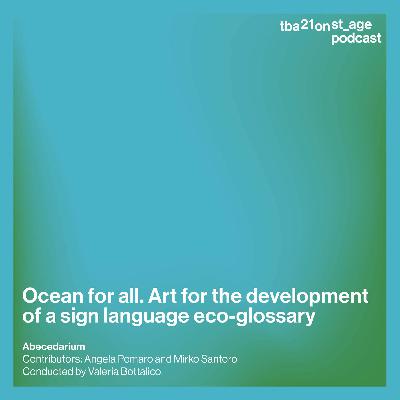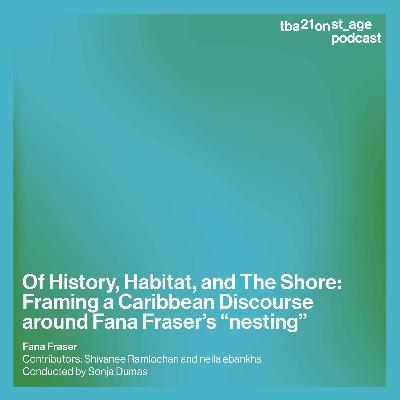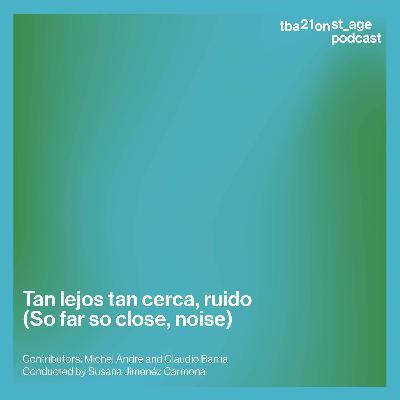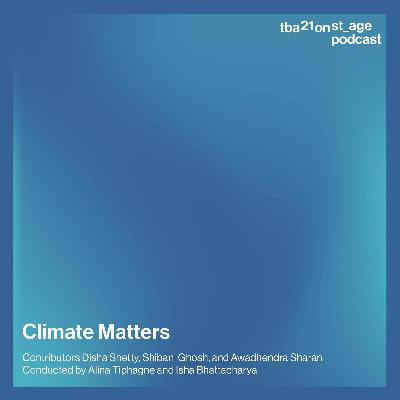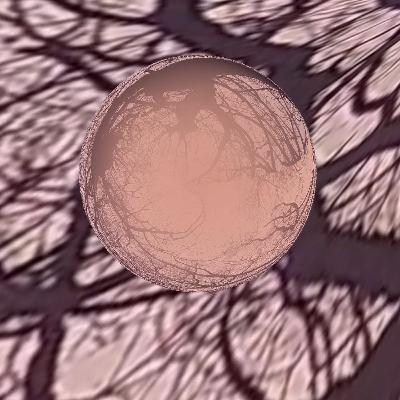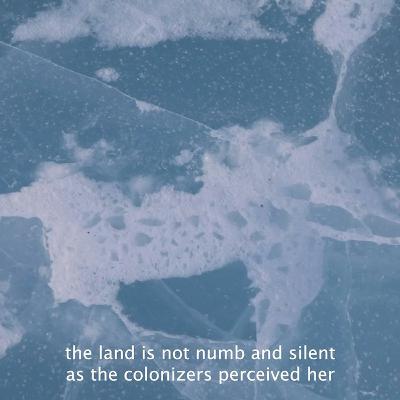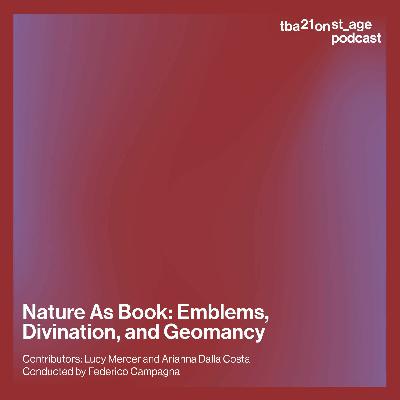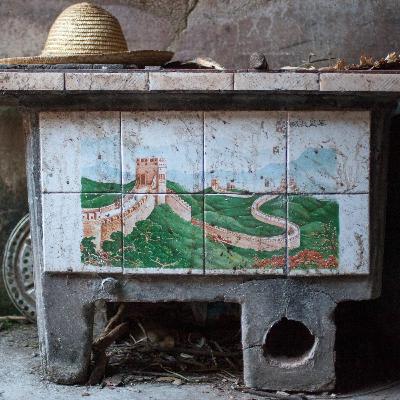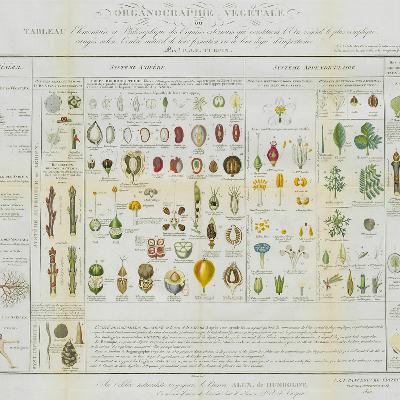Discover TBA21 on st_age
TBA21 on st_age

TBA21 on st_age
Author: TBA21 on st_age
Subscribed: 0Played: 7Subscribe
Share
© All rights reserved
Description
TBA21 on st_age is TBA21’s research and commissioning digital space. Based on long-term relationships of trust, it reaches out to bring a multiplicity of voices and contexts into conversation, supporting artist’s needs throughout both research and practice.
TBA21 on st_age focuses on environmental and social contemporary artistic practices, and presents video, animation, sound, and text works, as well as projects specifically designed to be experienced online. These are accompanied by a series of contextual materials, which make both the work and the research behind it accessible to a broader audience. These materials include artist-curator conversations, editorial podcasts, research clusters, and calls to actions, as well as the backst_age series, which connects the different projects through conversations, video glossaries, and curated views. All featured works remain the property of the artists and authors.
TBA21 on st_age focuses on environmental and social contemporary artistic practices, and presents video, animation, sound, and text works, as well as projects specifically designed to be experienced online. These are accompanied by a series of contextual materials, which make both the work and the research behind it accessible to a broader audience. These materials include artist-curator conversations, editorial podcasts, research clusters, and calls to actions, as well as the backst_age series, which connects the different projects through conversations, video glossaries, and curated views. All featured works remain the property of the artists and authors.
48 Episodes
Reverse
For video podcast in sign language please visit st_age website on the following link: https://www.stage.tba21.org/detail/ocean-for-all
-----------------------------------
Abecedarium. The Ocean in Sign Language is the name of a multi-year educational and participatory project in collaboration with ENS, Ente Nazionale Sordi (Italian Deaf Agency), and CNR ISMAR, Institute of Marine Sciences.
The main idea of the project is to create an eco-glossary in sign language, beginning with Italian sign language, before moving to other countries and international signs related to the marine world and the climate emergency. The ocean covers almost the entire Earth, and all human lives depend on the ocean—from the air we breathe to the food we eat to what we wear. Yet the ocean is also endangered because of the great impact of human activities.
To be able to care for the Ocean it is absolutely fundamental that everybody has access to artistic content and scientific knowledge without exclusion. We all need to be involved in safeguarding the planet, and everyone must have the information and tools required to access it.
‘Abecedarium, The Ocean in Sign Language’ proposes a vision of an ocean sea as an open access for all to information. This is an engaging and inspirational ocean, where different expressions and experiences converge, and are also translated into tangible manifestations related to contemporary culture.
Art, in the values it expresses, can be an effective means of social development to achieve this change. Building the possibility of interpreting our history together through training activities, and creating new forms of expression for new situations, for new worlds, means opening up to new areas of cultural growth, thereby guaranteeing processes of democracy, equity, exchange, and cultural interaction between the various components of society.
Contributors: Angela Pomaro and Mirko Santoro
Conducted by Valeria Bottalico
Born and raised in Trinidad and Tobago, Fana Fraser is currently a U.S. based contemporary dance artist who explores the nature and essence of things within a framework of exploratory embodiment. Her short film, nesting (2023), was filmed both in and near water, at the intersection of physical and philosophical constructs of borders, urgency, and care. It enjoins us to consider the environment, our responsibilities, and our humanity, and, although the film was shot on the Eastern Seaboard of the United States, it evokes a feeling of Caribbean consciousness and reality.
Three artists who live and work in the Caribbean region—dance practitioners Sonja Dumas (host) and neila ebankhs, from Trinidad and Tobago and Jamaica respectively, as well as Trinidad and Tobago poet Shivanee Ramlochan—examine the work in the context of the Caribbean’s relationship to its environment, the ache of its past, and musings on its future.
Sonja Dumas
Credits:
Contributors: Shivanee Ramlochan and neila ebankhs
Conducted by Sonja Dumas
In this podcast, artist and researcher Susana Jiménez Carmona talks with scientists Claudio Barría, a marine biologist, and Michel André, a bioacoustician. Both are involved to different degrees in the artistic production and research project ruido ê by Silvia Zayas, an audiovisual and performing artist—a fragment of the film ruido ê can be seen on this same platform. Some issues raised by or arising during the development of this project are addressed here by Barría and André, including interspecific coexistence in coastal cities, encounters with elusive electric rays, the effects of anthropogenic noise on living creatures and marine ecosystems, and collaborations between disparate humans.
Text by Susana Jimenéz Carmona
Credits:
Conducted by Susana Jimenez Carmona
Contributors: Michel André and Claudio Barria
The Climate Matters podcast will delve into the socio-political and economic contexts surrounding the climate change conversation in India. Through engaging discussions and expert insights, our guests will shed light on the frameworks and challenges related to climate policy and environmental law with a special focus on the communities most affected by climate change. The podcast will take a comprehensive approach to unpacking the complexities of climate action in India.
This podcast was produced and hosted by Khoj team members Alina Tiphagne, Head of Media and Communications, and Isha Bhattacharya, Junior Curator and Program Manager, who are accompanied by award-winning independent science journalist Disha Shetty, who writes mainly on public health, climate change, and women; Shibani Ghosh, environmental lawyer and fellow at the Centre of Policy Research (CPR), who specializes in environmental and access to information laws; and Awadhendra Sharan, Director of the Centre for study of developing societies (CSDS), whose research interests are in the fields of urban and environmental studies, present in his most recent publication Dust and Smoke: Air Pollution and Colonial Urbanism, India (2020).
Credit:
Contributors Disha Shetty, Shibani Ghosh, and Awadhendra Sharan
Conducted by Alina Tiphagne and Isha Bhattacharya
Link to full st_age episode: https://www.stage.tba21.org/episode/khoj-and-zuleikha-chudari
This podcast is based on the work of the artist Irene de Andrés, A orillas del Manzanares (On the Banks of the Manzanares River, 2022), whose research originates in a pool shaped like an ocean liner, known as La Isla (the island), which was built in the Madrilenian Manzanares river in the 1930s.
With the help of two experts—Malú Cayetano, landscape designer and forestry engineer, and David Uribelarrea del Val, professor of geomorphology at the Universidad Complutense de Madrid—we open a conversation about the Manzanares river, understood as a theater of memory, that puts into circulation the layers and flows of a city in relation to the forms of life that its river has made and will continue to make possible.
Violeta Janeiro Alfageme
Credits:
Contributors: Malú Cayetano and David Uribelarrea del Val
Conducted by Violeta Janeiro Alfageme
A piece of architecture is a fraction of a more extensive infrastructure. An experience of a building lingers, capturing the essence of a particular time and place. Modern architecture created motifs that traveled to other cities. Versions of these motifs often evoke a sense of familiarity when their variations are encountered. Some modern monuments' direct relationship to past regimes puts them at risk of being neglected, destructed, repurposed, or even preserved for myriad reasons. Often, there is no comprehensive framework in place to address their significance or ensure their preservation. This podcast delves into the interpretation of monumental projects as evidence of intricate relationships between regimes. It also reflects on the intangible yet profound impact of stories and their transformative impact on architecture, revealing the complex interplay between politics, imagination, and the ever-changing nature of constructed environments.
Ala Younis
Credits:
Contributors: Dina Taha and Ali Yass
Conducted by Ala Younis
https://www.stage.tba21.org/episode/sahil-naik
Focusing on the fascinating species of the sperm whale, this conversation brings together José Luis Espejo, researcher and curator, and Txema Brotons, biologist specialized in whales and acoustics, and Tursiops' Association scientific director. The podcast proposes an archaeology of the means by which science and other branches of knowledge first began to listen to and classify cetacean sounds. The scientific research carried out can help us understand the impact of anthropogenic sound on the communication systems of whales, with a focus on the cachalots.
The podcast departs from talk took place at the Museo Nacional Thyssen-Bornemisza, Madrid, on May 25, 2023, as a part of the public program of the exhibition “Wu Tsang: Of Whales.”
Are you eager to dive deeper into the Ocean? Explore the vast depths of knowledge and immerse yourself in https://ocean-archive.org/, TBA21–Academy’ digital platform.
Credits:
Txema Brotons in conversation with José Luis Espejo
Cover image: Cocos Research Expedition, 2014. Photo: Jose Alejandro Alvarez.
In this podcast Carlos Duarte, scientist and oceanographer, discusses how anthropogenic noise—meaning noise produced by human beings and the machines they make and use—produces an impact on marine fauna, and asks how it is possible to reverse this impact of human pollution. Duarte tells us about the efforts to understand how sound communication functions in the Ocean among the different species, and the importance of art in conveying this to the general public in order to put policies into action.
The podcasts consists of interventions by Carlos Duarte, extracted from the conversation with sound artist Jana Winderen, in a talk moderated by curator and researcher José Luis Espejo that took place at the Museo Nacional Thyssen-Bornemisza, Madrid on April 18, 2023, which was part of the public program of the exhibition “Wu Tsang: Of Whales.”
Are you eager to dive deeper into the Ocean? Explore the vast depths of knowledge and immerse yourself in https://ocean-archive.org/, TBA21–Academy’ digital platform.
Credits:
Speaker: Carlos Duarte
Cover image: Whales, Silverbanks Research Expedition, 2013. Photo: Jose Alejandro Alvarez.
Artist Bo Choy speaks with Sayana Namsaraeva, an anthropologist from Buryatia, a republic in Eastern Siberia bordering Mongolia, whose work focuses on the Indigenous cosmologies of the people from her region. Together they delve into animated landscapes that surround Lake Baikal, the deepest and oldest freshwater lake on the planet.
Their conversation considers the intimate connection between these largely untouched landscapes and the rich fabric of belief systems, Indigenous cosmologies, oral traditions, and mythologies that emerge from them. Moving through their shared and diverging influences spanning pre-Buddhism shamanisms, Chinese and Mongolian Buddhisms, Feng Shui, and ancient eastern philosophies, Bo Choy and Sayana Namsaraeva discuss the spirit-life of these lands as they rub up against planetary climate urgencies, and contemplate how ancient wisdoms can have a vital role in the local and global relational ecologies we must form for the future.
If you want to delve deeper into the permafrost, visit the full online programme Dissolving Earths https://dissolving.earth/
Credits:
Soundscape and sound-editing by Either/Or Productions.
Cover image: Bo Choy, ‘These Yearnings Of The Exiled Souls, To Which Time Shall We Send Them?,’ 2022, video still
Cultural theorist, Astrida Neimanis’ theory of Hydrofeminism, positions water as an ever-shifting body that connects all beings and archives all histories. Unlike other bodies of water however, the permafrost wishes to remain still. Astrida Neimanis speaks with permafrost hydrologist, Nikita Tananaev to discuss the cultural, philosophical, and ecological implications of permafrost degradation as it disrupts ancient ecosystems suspended in the ice.
This podcast was first released by RW MACBA, before the UK sanctions of the Dissolving Earths program were lifted.
The soundscape and sound-editing is by Either/Or Productions.
If you want to delve deeper into the permafrost, visit the full online programme Dissolving Earths https://dissolving.earth/
Credits:
Cover image: al-yené, ‘ærystıьla,’ 2022, video still
Drawing on the importance of poetry and the practice of symbolic interpretation for an evolving politics in Omarzad’s practice, this podcast is hosted by philosopher and writer Federico Campagna, who is joined by contributors Dr Lucy Mercer, lecturer of creative writing at Goldsmith University and author of the recent poetry book Emblem (Prototype, 2022), and Arianna Dalla Costa, from the Warburg Institute, researcher on the ancient arts of divination and geomancy.
Two areas of tension are explored: poetry and politics; magic and science. Emblems, as thresholds between image and text, are discussed with Dr Mercer: their origin and definition, symbology and function, as well as their convergences and divergences with memes and instagram motivational posts. Dalla Costa discusses divination and geomancy, looking into their etymologies and particularities within the context of the intellectual encounter between different monotheistic religions in the Medieval Mediterranean, challenging contemporary understandings of the age of the Crusades as a time of intolerance.
Credits:
Contributors Lucy Mercer and Arianna Dalla Costa
Conducted by Federico Campagna
The work of Ana María Millán (Santiago de Cali, 1975) uses the language of video games to channel collective work processes, in which she addresses diverse realities that are constructed as they are enunciated. Popular feminism, the struggle against extractivism, and the Colombian Pacific have been key issues of Millán’s work in recent years. Through the voices of philosopher Michael Marder, who talks about his thinking on the spirituality of plants, and sociologist and popular feminist activist Betty Ruth Lozano, we explore ways of thinking that inform Ana María Millán's practice.
Catalina Lozano
Credits:
Contributors: Michael Marder and Betty Ruth Lozano
Conducted by Catalina Lozano
This podcast, conducted by visual artist and film scholar Pallavi Paul, explores the relationship between image making and the ecological. Departing from artist Pranay Dutta’s piece Neti (2022), dealing with the Sundarbans regions in South-East Asia, Paul interviews artist, photographer, environmental campaigner, writer, and curator Ravi Agarwal, and filmmaker, video artist, and film scholar Shaunak Sen. Unfolding across geological time scales on the one hand and microscopic cellular life on the other, the 'ecological' is often in excess of optical infrastructures. What does this mean for photography and cinema? Is an apocalyptic world a world without people or a world without images? What is the stake of art in ecological justice?
Credits:
Contributors Ravi Agarwal and Shaunak Sen
Conducted by Pallavi Paul
This podcast accompanies the work Pájaro, cómeme (2022) by artist Beatriz Santiago Muñoz. Hosted by María Montero Sierra, Head of Program of TBA21–Academy, it deals with the role that the Ocean takes in the practices of decolonization in the Caribbean, and how these affect particularly to Puerto Rico, today a non-incorporated territory of the USA, a free associated state with self-government status. Montero Sierra is joined by contributors Reniel Rodríguez Ramos, Doctor of Anthropology at the University of Florida and Professor of the Social Sciences Program of the Universidad de Puerto Rico, who is specialized on Isthmo-Colombian and Transatlantic precolonial connections; and Nicole Cecilia Delgado, poet, translator, and co-founder of the printing workshop La Impresora, as well as author of adjacent islands | islas adyacentes (2022) which gives title to the podcast and encompasses the bodies of work subtropical dry (La Impresora, 2015) and Amoná (artist book, 2013); Delgado is interviewed by Uroyoán Noel, translator to English of islas adyacentes, as well as poet, critic and teacher at the New York University yand Stetson University.
Through these voices we discover how the archaeological evidence inscribed in the natural spaces as well as the nomadic writings inspiring the recuperation of indigenous languages are two different strategies with a shared goal: decolonize the Caribbean. Both processes situate the Ocean not just as an atemporal space that links the prehistoric and foundational past of the Caribbean with the current moment, but which broaden the identitarian processes of the region by bringing in an oceanic vision.
Credits:
Contributors: Reniel Rodríguez Ramos, Nicole Cecilia Delgado & Urayoán Noel
Conducted by María Montero Sierra
Sound editor: Roberto Bosoms
This Spanish-language podcast, hosted by curator and researcher Carolina Jiménez, accompanies the premiere of the documentary Aquel verano del 22. Las leyes [The Summer of ‘22. The Laws] by artist and filmmaker Lorenzo Sandoval for TBA21. Carolina and Lorenzo have been in conversation over the years, often pursuing collaborative research together, as with their current project Rhythmepistemologies, which they are working on under the name Office for the Edition of Patterns and Poetics of Repetition. OEPPR is an organization for the analysis, production, and redistribution of the intersections between infrastructures and cosmovisions.
In this podcast they explore the continuities between body and landscape, addressing the implications of different semiotic, listening, and reading devices within and beyond human language. In doing so they consider provisional in(ter)ferences in the establishment of a new legal paradigm of the rights of nature for Mar Menor in Murcia. They review the extractivist logic that has been apparent in the region for decades, fueled by the interconnection of mining, agroindustry, and urbanism that flourished during Franco’s era of developmentalism. Considering how such conditions might be reassembled, they look/listen to flamenco from La Unión as both a symptom of pain and trauma and practice of inscribing a corpus of vernacular knowledge of the workers and the landscape otherwise.
Contributors:
Teresa Vicente, Professor of Philosophy of Law and director of the Chair of Human
Rights and Rights of Nature at the University of Murcia. Promoter of the ILP of the Mar
Menor.
Paco Paredes, flamencologist, writer, advisor to the Festival del Cante de las Minas de
La Unión.
Sound clips:
Rosendo García Fernández, Minera and Taranta. Recording of the Festival del Cante
de las Minas de La Unión, 2022.
Baldomero Cortés Heredia, Minera and Taranta. Recording of the Festival del Cante de
las Minas de La Unión, 2022.
Acknowledgements:
dublab BCN
This podcast, which accompanies the video work The Mountain That Hid by Sim Chi Yin on TBA21 on st_age, is hosted by researcher and curator Kathleen Ditzig. Through the perspective of literature and the work of Tash Aw and Preeta Samarasan, it examines how poetic license and personal family stories can speak to uncomfortable political Cold War histories that are part of nation-building projects in Southeast Asia. Aw and Samarasan are two diasporic Malaysian writers, whose works have included familial and generational narratives to speak to the long reach of the region’s and Malaysia’s racial and political histories. Through their perspectives, this podcast touches on the necessary nuance of considering anti-colonial projects, the radicality of writing family histories, and the necessity of criticality in reviewing national histories and the gaps, erasures, and silences they leave in their wake.
Credits:
Contributors Tash Aw & Preeta Samarasan
Conducted by Kathleen Ditzig
Cover image: Sim Chi Yin
This podcast, which accompanies the performance Carried Away: Beyond a Rooted Condition by Madison Bycroft, Nana (Anaïs) Pinay, and Léo Landon Barrett for TBA21 on st_age, is hosted by researcher and writer Jess Saxby. It draws links between the artwork’s themes of naming, taxonomy, and categorisation to the broader discipline of botany, and considers the performance’s location in the botanical gardens of Córdoba. Samir Boumediene is a historian whose research focuses on the search for medicinal plants in the 15th century, and Chanelle Adams is a multidisciplinary essayist, researcher, and translator who is currently working on the political ecology of medicinal plants in Madagascar. Through their insights we can trace histories of bioprospecting, taxonomy, and appropriation of knowledge and resources that continue to this day.
Credits:
Contributors: Chanelle Adams and Samir Boumediene
Conducted by Jessica Saxby
Cover image: Source gallica.bnf.fr / Bibliothèque nationale de France
This podcast, accompanying Laia Estruch’s performance project for TBA21 on st_age, is hosted by curator, writer, and lifelong birder Max Andrews. It takes flight into the realm of birds, looking at politics and practices that disrupt dominant historical narratives and exceed scientific and cultural boundaries. Alex Holt is a spokesperson for Bird Names for Birds, a movement to decolonise bird names, and Hollis Taylor is a zoömusicologist specializing in birdsong. Through their perspectives we glimpse new and speculative kinds of human–bird narratives; what Anna-Sophie Springer and Etienne Turpin have described as “minor ornithologies.”
Credits:
Contributors: Alex Holt and Hollis Taylor
Conducted by Max Andrews
Audio Clips Credits:
PIED BUTCHERBIRD SINGING. “Wordsworth” abandons formal song with a coda of mimicry, recorded 28 September 2007 on Wordsworth Road, N Queensland at 4:10am. © Hollis Taylor / piedbutcherbird.net
SUPERB LYREBIRD SINGING. Audio clip #5: Mimicry of birdsong and two flute phrases from a “flute lyrebird” recorded at Enfield State Forest (130 kilometres from Allan’s Water) at 6:53 a.m. on 16 June 2013 by Hollis Taylor. © Hollis Taylor / flutelyrebird.com
------
The concept of "Minor Ornithology" was coined by Anna-Sophie Springer and Etienne Turpin in 2013 and is their title of an ongoing series of multidisciplinary collaborations within their curatorial framework Reassembling the Natural / reassemblingnature.org and their edited publication, These Birds of Temptation (K. Verlag & Haus der Kulturen der Welt, 2021).
In this podcast, sociologist and activist Ximena Cuadra Montoya is accompanied by two of the protagonists of the struggle for the defense and deprivatization of water in Chile: Manuela Royo, lawyer and former constituent of the Chilean Constitutional Convention, who is part of MODATIMA (Movement for the Defense of Water, Protection of the Earth and Respect for the Environment), along with activist Luz María Huenupi, spokeswoman of the Mapuche communities defending the Truful-Truful river, a sacred space to these communities that is endangered by a hydroelectric project in the Melipeuco territory.
Departing from Mapuche artist Seba Calfuqueo’s performance Ko ta mapungey ka (Water is also territory), at the Centro de Creación Contemporánea de Andalucía C3A in Córdoba on June 3, 2022, the podcast explores the relevance of the most fundamental element to sustain life in a country where water is privately owned as an inheritance of Augusto Pinochet’s Constitution. In the context of the upcoming vote about the Chilean Constitutional Convention on September 4, 2022, we will listen to their experiences and testimonies about the possible changes to come in Chile.
Credits:
Contributors: Manuela Royo & Luz María Huenupi
Hosted by Ximena Cuadra Montoya
In this podcast, anthropologist Anna Lowenhaupt Tsing, Professor at the University of California, Santa Cruz, and Aarhus University, Denmark, meets Heather Anne Swanson, a fellow anthropologist at Aarhus University and collaborative partner for Sonia Levy’s film Creatures of the Lines (2021) previously presented on TBA21 on st_age. Tsing is the author of several books, including The Mushroom at the End of the World, as well as a co-editor of the digital project Feral Atlas together with Jennifer Deger, Alder Saxena Keleman, and FeiFei Zhou.
In the podcast, Tsing and Swanson discuss several of Tsing’s recent projects, while also describing the significance that these approaches had on Creatures of the Lines (2021). Along the way, this conversation covers wide-ranging topics, including Tsing’s notion of feral ecologies—i.e. those shaped by interactions with human infrastructures, but outside of the control of the humans who designed those infrastructures. The dialogue also features a special focus on oceanic and coastal contexts, including Tsing’s new work on mangroves in Southeast Asia and her idea of “fragmented porosities” as well as its conceptual links with Levy’s film on British canal worlds. Both cases highlight how colonial infrastructures are part and parcel of Anthropocene ecologies.


